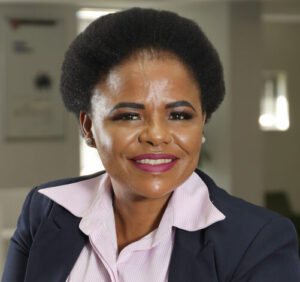
Jennifer Molwantwa
Republic of South Africa
CEO, Water Research Commission of South Africa
Dr Jennifer Molwantwa was born and bred in Kagiso Township, Mogale City in the Province of Gauteng. Her career started at Pulles Howard & de Lange, later Golder Associates Africa as a research assistant and water resource consultant, respectively before joining Digby Wells Environmental as Unit Manager. She joined the Water Research Commission (WRC) in 2014 as a Research Manager responsible for water resource quality prior to being appointed Executive: Water Resource Management at the Inkomati-Usuthu Catchment Management Agency (IUCMA) where she served for five years (2016 to 2022).
She holds a PhD: Biotechnology and a Postgraduate Diploma in Enterprise Management from Rhodes University. A Registered Professional Natural Scientist (Pr. Sci. Nat.) with SACNASP who a member of the Institute of Directors SA (IoDSA) is also. She competed the International Executive Development Program offered jointly by Wits Business School and the London School of Business.
She gained extensive governance experience from serving on the Governing Board of IUCMA, the council of the University of KwaZulu Natal (UKZN) where she also represented Council on the University Senate. Currently, she serves on the boards of the Water Institute of Southern Africa (WISA) and the Environmental Assessment Practitioners Association of South Africa (EAPASA). She is also a member of the Department of Fisheries Forestry and the Environment (DFFE) Sub-Committee appointed to develop the National Implementation Plan (NIP) for the management of chemicals in South Africa.
Dr Molwantwa served as a Commissioner on the on the 1st National Planning Commission (2010-2015), an advisory body to the President, that developed the National Development Plan (NDP) and Vision 2030 for the Republic of South Africa.
Her passion is capacity building, skills development, and inclusion of Historically Disadvantaged Individuals (HDI) in the mainstream science and technology careers and economy of which water and land are integral. She believes: “the way for women to participate at all levels of the economy, science and technology, knowledge generation and business depends on the opportunities created by women before them”.
